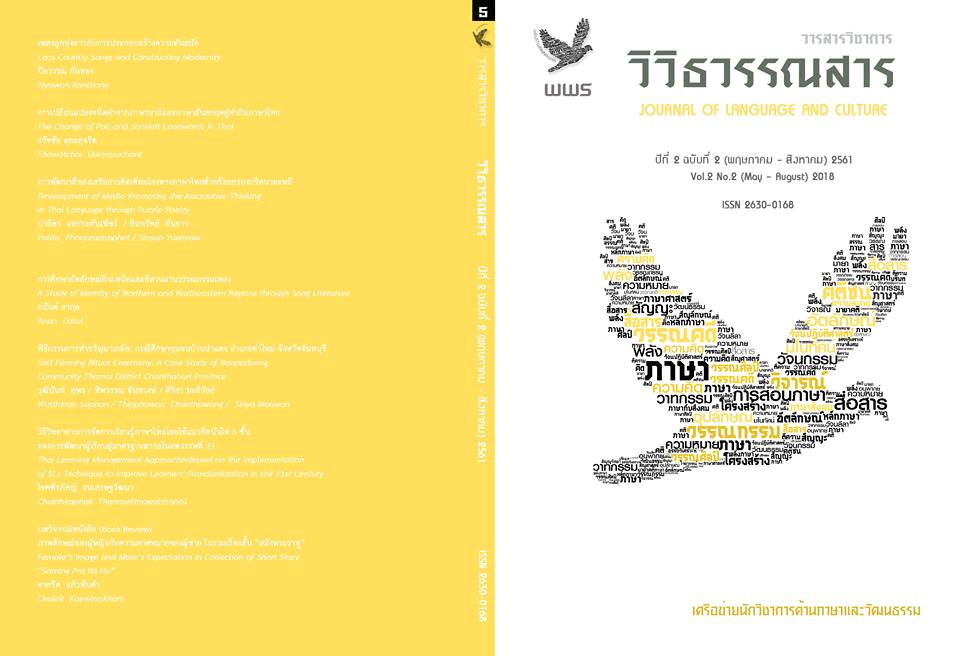Thai Learning Management Approaches Based on the Implementation of 5Ls Technique to Improve Learners' Standardization in the 21st Century
Main Article Content
Abstract
This research article aimed to present the Thai learning management approach and implementation of the 5Ls technique to improving learners' standardization in the 21st century.The 5Ls technique included: 1) Learning to Question; 2) Learning toSearch; 3) Learning to Construct; 4) Learning to Communicate, and 5) Learning to Serve; moreover, this technique conceptualized by the UNESCO was classified into 4major learning steps:1) ‘Learning to know’; 2) ‘Learning todo’; 3) ‘Learning to live together’, and 4) ‘Learning to be’. For research methodology, 58 Thai language teachers teaching for both primary and secondary education levels in upper northern regions (Chiangrai, Chiangmai, Phayao, Nan, and Lamphun provinces), as well as attending the training project for teacher’s self-academic development held in the 2015 academic year were all carried out for data collection. Research instruments drawn for this study encompassed 1) An assessment test on guest lecturer’s on-site supervision affecting the Thai language teachers’ 5Ls technique-based learning management, and 2) An assessment test on the Thai language teacher’s learning management competencies obtained from their training project for teacher’s self-academic development. The data were statistically analyzed using Mean, and Standard Deviation.The findings of the study revealed that this 5Ls technique-based Thai learning management could be all implemented for the learners’ Thai language learning enhancement; moreover, the teaching steps could be served for the learners’ learning behaviors because of the learners’ importance of their roles in autonomous learning. According to the assessment of the guest lecturers’ on-site supervision, it was also stated that the Thai teachers’ 5Ls technique-based learning management, with its mean of 4.62, were mostly found; otherwise, the assessment of the Thai teachers’ learning management competencies obtained from the training project for teacher’s self-academic development, with its mean of 4.76, were mostly found.
Article Details
Copyright is that of the journal any reproduction must be permitted by the editor of journal
References
Kan chat kan rian kan son nai rong rian mattrathan sakon
chabap prap prung. (in Thai) [Guideline for instruction in
Universal Standard School, Revised edition]. Bangkok: the Thai
Cooperative Community for Agriculture Press].
Cobb, P. Wood L. and Yakel, E. (1994). Constructivist Approach to Second
Grade Mathematics. in E. Von Glasersfeld (ed.). Radical
Constructivism in Mathematics Education, pp. 157–176.
Department of Curriculum and Instruction Development. (2001). Lak sut
kan sueksa khan phuen than phuttha sakkarat 2544. (in Thai)
[Basic Education Core Curriculum (2001)]. Bangkok: Academic
Quality Development.
Department of Curriculum and Instruction Development. (2008).
Laksut kan sueksa khan phuen than phutthasakkarat 2551.
(in Thai) [Basic Education Core Curriculum (2008)]. Bangkok:
Express Transportation Organization of Thailand Press. in Cole,
M. and Others. eds. Cambridge: Harvard University Press.
Kanchanarakphong, S. (2001). Kan chat krabuankan rian ru thi nen
phu rian pen samkhan kan son baep san sang khwam ru.
(in Thai) [Management of Learning Process based on
Learner-Centered method and Knowledge Constructive
teaching method]. Bangkok: Candidmedia.
Khamnet, W. (2009). Kan chat kitchakam tam naeo khit kan sang
khwam ru niyom phuea song soem thaksa lae nisai rak kan an
khong nakrian radap chan matthayomsueksapithi 2. (in Thai)
[An activity arrangement based on the concept of knowledge
constructivism to promote skill and behavior of reading of the
grade 8 students], Independent Study. Chiang Mai University,
Chiang Mai.
Khowtrakun, S. (1994). Chittawitthaya kan sueksa. (in Thai) [Educational
Psychology], (3rd ed.) Bangkok: Chulalongkorn University Press.
Munkham, S & Munkham, O. (2002). Withi kan chat kan rian ru: phuea
phatthana krabuan kan khit. (in Thai) [The method of teaching:
learning to develop a thinking process]. Bangkok: Phapkanphim.
Phonmani, S. (2002). Phasa kap kanson. (in Thai) [Language and Teaching].
Bangkok: Kletthai.
Rotreangkha, W. (1997). Constructivism. Bangkok: Faculty of Education,
Kasetsart University.
Vygotsky, L. (1978). Mind in Society: The Development of Higher
psychological Processes.
Zahoric, J.A. (1995). Constructivist Teaching, Bloomington, Indiana:
Phi Delta Kappa Educational Foundation.


